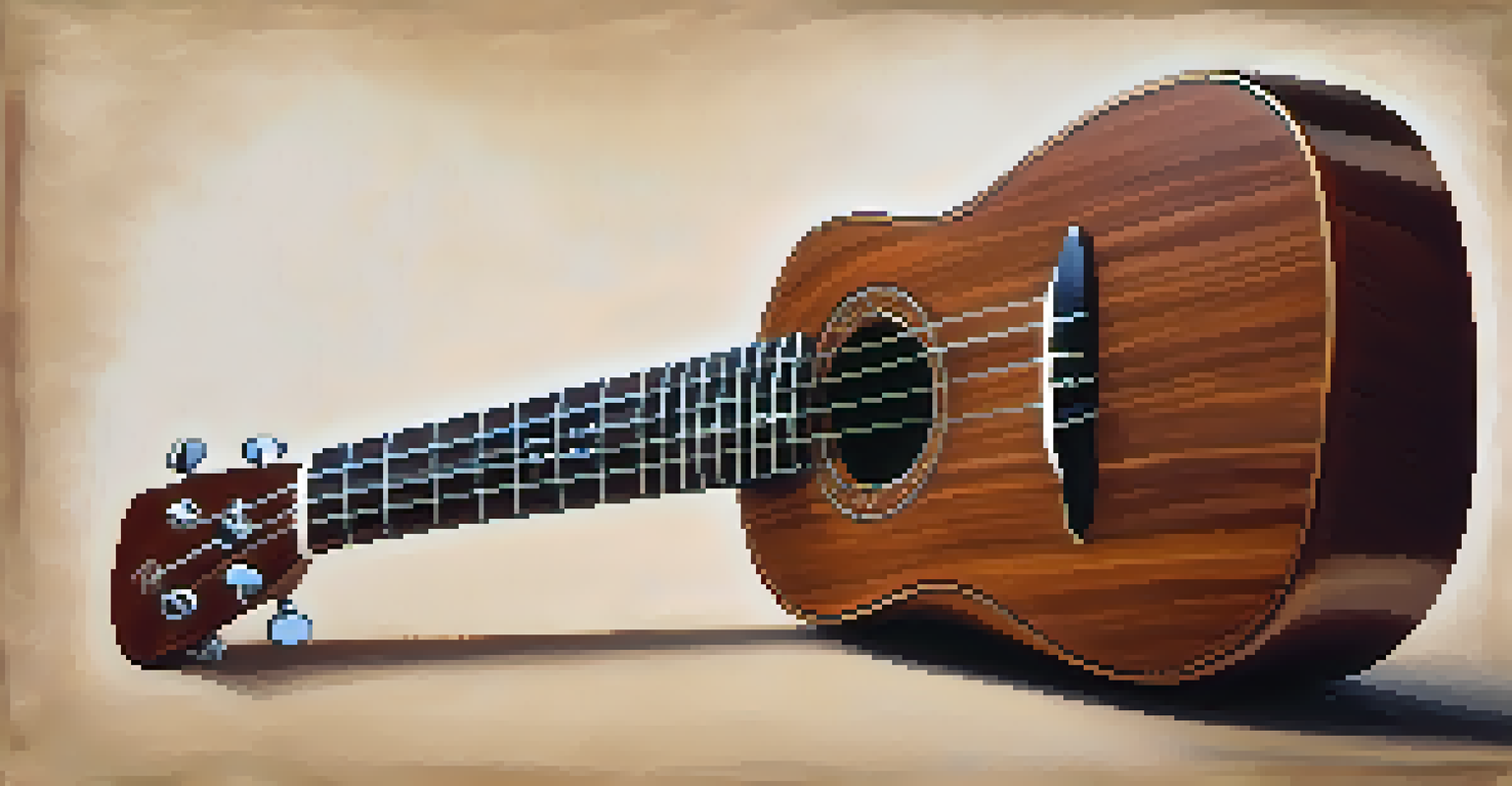Choosing the Right Ukulele: A Beginner's Buying Guide

Understanding Ukulele Types: Soprano, Concert, Tenor, Baritone
When starting your ukulele journey, it's essential to understand the different types available. The soprano is the smallest and most common, offering a bright sound that's perfect for beginners. In contrast, the concert ukulele is slightly larger, producing a richer tone while remaining easy to handle.
The ukulele is a tiny instrument with a big heart.
The tenor ukulele is even bigger, ideal for those looking for deeper sounds and more frets for advanced playing. Finally, the baritone ukulele resembles a guitar in size and tuning, making it a unique option for those who want a fuller sound. Choosing the right type will significantly influence your playing experience.
Think about what kind of music you want to play and how comfortable you feel with each size. Testing different types in a music store can help you find the perfect fit for your style.
Choosing the Right Size: Comfort and Playability
Size matters when it comes to ukuleles! It’s crucial to select one that feels comfortable in your hands, especially for beginners. A ukulele that's too big or heavy can make learning difficult and frustrating, so finding the right size is key.

Consider how you plan to use the ukulele, whether it's for casual strumming, performing, or practicing. For younger players or those with smaller hands, a soprano or concert ukulele might be more suitable, while larger players might prefer a tenor or baritone.
Choose the Right Ukulele Type
Understanding the differences between soprano, concert, tenor, and baritone ukuleles can greatly enhance your playing experience.
Ultimately, the right size should feel like an extension of yourself. Don’t hesitate to try out a few different sizes to see which one resonates with you.
Material Matters: Wood Types and Their Impact on Sound
The material of your ukulele can significantly affect its sound quality. Most ukuleles are made from various types of wood, each contributing to unique tonal characteristics. For instance, mahogany offers a warm, mellow sound, while spruce delivers a bright, clear tone.
Music is the shorthand of emotion.
Laminated woods are often more affordable and durable, making them great for beginners. However, solid wood ukuleles typically provide superior sound quality and resonance, making them a worthy investment as you progress.
When choosing your ukulele, consider not only the sound but also your budget. Finding a balance between quality and price is essential for a satisfying musical journey.
Budgeting for Your Ukulele: Finding the Right Price Range
Setting a budget is a crucial step in your ukulele buying process. Prices can vary widely, from budget-friendly options to high-end models. As a beginner, you don’t need to break the bank; many affordable ukuleles provide excellent sound quality and playability.
Typically, a good beginner ukulele can be found in the $50 to $150 range. It’s a sweet spot where you can get a reliable instrument without overspending. Remember, investing a little more can lead to a better playing experience and longevity.
Size and Comfort Are Key
Selecting a ukulele that feels comfortable in your hands is crucial for beginners to facilitate learning and enjoyment.
Ultimately, choose a ukulele that feels right for your budget and skill level. It's better to start with a decent instrument that encourages practice than to struggle with one that's hard to play.
Essential Features: What to Look for in a Ukulele
When shopping for a ukulele, several features can enhance your playing experience. Look for quality tuners, as they ensure your ukulele stays in tune longer. Good fretboard materials can also make a difference in playability and comfort.
Additionally, consider the action of the strings—the distance between the strings and the fretboard. A lower action is easier to play, especially for beginners. Some ukuleles come with built-in pickups for amplification, perfect for those who want to perform.
As you explore options, make a checklist of features that matter most to you. Finding a ukulele with the right combination of these features can significantly improve your learning experience.
The Importance of Brand: Trustworthy Ukulele Manufacturers
Not all ukulele brands are created equal, and choosing a reputable manufacturer can make a world of difference. Established brands often have a history of quality and customer satisfaction, which can guide your decision. Look for brands with positive reviews and a loyal following.
Brands like Kala, Lanikai, and Cordoba have built strong reputations for producing reliable instruments for beginners. These companies offer a range of models, ensuring that you can find something that fits your needs and budget.
Quality Materials Matter
The type of wood used in your ukulele significantly influences its sound quality, making material selection an important consideration.
Researching brands can save you time and frustration down the road. Remember, a trusted brand will likely provide better customer support and warranty options.
Trying Before Buying: The Importance of Hands-On Testing
One of the best tips for choosing the right ukulele is to try before you buy. Visiting a music store allows you to pick up different models and see how they feel in your hands. This tactile experience is invaluable, as you can gauge the sound and comfort level firsthand.
When testing, strum a few chords and see how the ukulele responds to your playing style. Pay attention to the tuning stability and overall feel. Don't hesitate to ask staff for recommendations or to provide guidance during your visit.

Ultimately, the right ukulele should resonate with you both in sound and comfort. Trust your instincts, and don’t rush the process—finding the perfect ukulele is part of the fun!
Caring for Your Ukulele: Maintenance Tips for Longevity
Once you've chosen your ukulele, it's essential to care for it properly to ensure it lasts. Regular maintenance includes cleaning the strings and body, which can prevent buildup and keep your instrument sounding great. Use a soft cloth to wipe down the surface after each use.
Store your ukulele in a safe place, ideally in a case or bag, to protect it from temperature changes and damage. Humidity can also affect wooden instruments, so consider using a humidifier for added protection.
Taking these simple steps can significantly extend the life of your ukulele. A little care goes a long way in preserving the sound quality and playability of your cherished instrument.